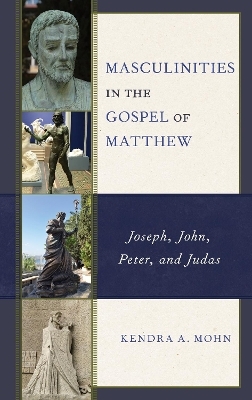
Masculinities in the Gospel of Matthew
Joseph, John, Peter, and Judas
Seiten
2024
Lexington Books/Fortress Academic (Verlag)
978-1-9787-0948-5 (ISBN)
Lexington Books/Fortress Academic (Verlag)
978-1-9787-0948-5 (ISBN)
Kendra A. Mohn traces how the constructions of nonelite men in the Gospel of Matthew negotiate expectations of elite Roman masculinity. Highlighting wealth, divine service, and dominating control, Mohn shows how the depictions of Joseph, John, Peter, and Judas shape expectations of men in terms of discipleship, power, and leadership.
In Masculinities in the Gospel of Matthew: Joseph, John, Peter, and Judas, Kendra A. Mohn examines the masculinity of four figures in Matthew’s Gospel in light of ancient understandings of masculinity exemplified by Roman emperors and emulated by figures such as Herod the Great and Herod Antipas. Utilizing three criteria common to elite Roman hegemonic expressions of masculinity—wealth, divine service, and dominating control over self and others—Mohn argues that the nonelites represented by the New Testament texts negotiated ancient expectations of masculinity in a variety of ways that both subverted and upheld Roman imperial ideals. This response to dominant masculinity marked by hegemony has important implications for the understanding of critical concepts such as discipleship and leadership, as well as the expectations for masculinity expressed in contemporary religious contexts.
In Masculinities in the Gospel of Matthew: Joseph, John, Peter, and Judas, Kendra A. Mohn examines the masculinity of four figures in Matthew’s Gospel in light of ancient understandings of masculinity exemplified by Roman emperors and emulated by figures such as Herod the Great and Herod Antipas. Utilizing three criteria common to elite Roman hegemonic expressions of masculinity—wealth, divine service, and dominating control over self and others—Mohn argues that the nonelites represented by the New Testament texts negotiated ancient expectations of masculinity in a variety of ways that both subverted and upheld Roman imperial ideals. This response to dominant masculinity marked by hegemony has important implications for the understanding of critical concepts such as discipleship and leadership, as well as the expectations for masculinity expressed in contemporary religious contexts.
Kendra A. Mohn (PhD, Brite Divinity School) is Lead Pastor of Trinity Lutheran Church, Fort Worth, TX.
Chapter 1: Introduction and Methodology
Chapter 2: Joseph and King Herod
Chapter 3: John the Baptist and Herod Antipas
Chapter 4: Peter
Chapter 5: Judas
Conclusion
| Erscheinungsdatum | 17.01.2024 |
|---|---|
| Sprache | englisch |
| Maße | 159 x 237 mm |
| Gewicht | 549 g |
| Themenwelt | Religion / Theologie ► Christentum ► Kirchengeschichte |
| Sozialwissenschaften ► Soziologie ► Gender Studies | |
| ISBN-10 | 1-9787-0948-X / 197870948X |
| ISBN-13 | 978-1-9787-0948-5 / 9781978709485 |
| Zustand | Neuware |
| Haben Sie eine Frage zum Produkt? |
Mehr entdecken
aus dem Bereich
aus dem Bereich
von Athanasius bis Gregor dem Großen
Buch | Softcover (2024)
C.H.Beck (Verlag)
CHF 18,90
mein Leben mit Benedikt XVI.
Buch | Hardcover (2023)
Verlag Herder
CHF 39,90


